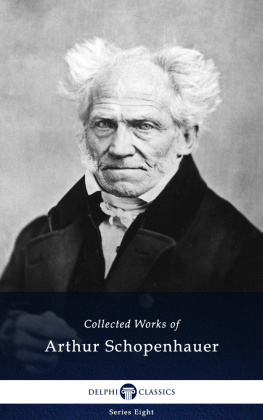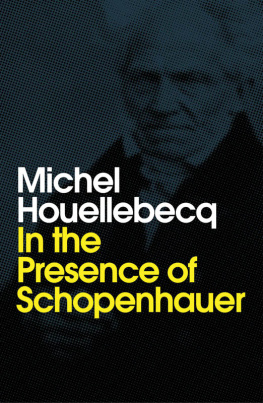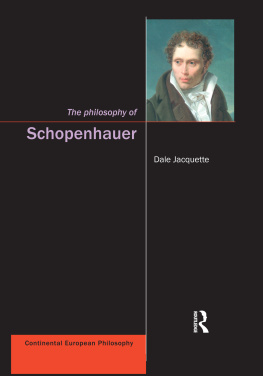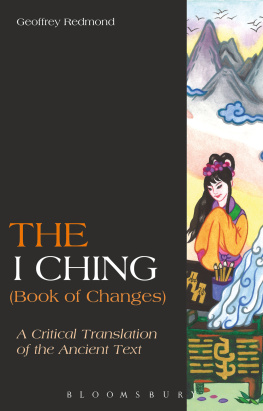SCHOPENHAUERS
THE WORLD AS WILL AND
REPRESENTATION
Bloomsbury AcademicReaders Guides
Bloomsbury Academics Readers Guides are clear, concise and accessible introductions to classic works of philosophy. Each book explores the major themes, historical and philosophical context and key passages of a major philosophical text, guiding the reader toward a thorough understanding of often demanding material. Ideal for undergraduate students, the guides provide an essential resource for anyone who needs to get to grips with a philosophical text.
Readers Guidesavailable from Bloomsbury Academic
Aristotles Nicomachean Ethics Christopher Warne
Aristotles Politics Judith A. Swanson and C. David Corbin
Berkeleys Principles of Human Knowledge Alasdair Richmond
Berkeleys Three Dialogues Aaron Garrett
Deleuze and Guattaris Capitalism and Schizophrenia Ian Buchanan
Deleuzes Difference and Repetition Joe Hughes
Derridas Writing and Difference Sarah Wood
Descartes Meditations Richard Francks
Hegels Philosophy of Right David Rose
Heideggers Being and Time William Blattner
Heideggers Later Writings Lee Braver
Hobbess Leviathan Laurie M. Johnson Bagby
Humes Dialogues Concerning Natural Religion Andrew Pyle
Humes Enquiry Concerning Human Understanding Alan Bailey and Dan OBrien
Kants Critique of Aesthetic Judgement Fiona Hughes
Kants Critique of Pure Reason James Luchte
Kants Groundwork for the Metaphysics of Morals Paul Guyer
Kierkegaards Fear and Trembling Clare Carlisle
Kuhns The Structure of Scientific Revolutions John Preston
Lockes Essay Concerning Human Understanding William Uzgalis
Lockes Second Treatise of Government Paul Kelly
Mills On Liberty Geoffrey Scarre
Mills Utilitarianism Henry West
Nietzsches On the Genealogy of Morals Daniel Conway
Nietzsches The Birth of Tragedy Douglas Burnham and Martin Jesinghausen
Platos Republic Luke Purshouse
Platos Symposium Thomas L. Cooksey
Rawlss Theory of Justice Frank Lovett
Rousseaus The Social Contract Christopher Wraight
Sartres Being and Nothingness Sebastian Gardner
Spinozas Ethics Thomas J. Cook
Wittgensteins Tractatus Logico Philosophicus Roger M. White
SCHOPENHAUERS
THE WORLD AS WILL AND
REPRESENTATION
A Readers Guide
ROBERT WICKS

Bloomsbury Academic
An imprint of Bloomsbury Publishing Plc
50 Bedford Square | 1385 Broadway |
London | New York |
WC1B 3DP | NY 10018 |
UK | USA |
www.bloomsbury.com
Bloomsbury is a registered trade mark of Bloomsbury Publishing Plc
First published 2011
Robert Wicks, 2011
Robert Wicks has asserted his right under the Copyright,
Designs and Patents Act, 1988, to be identified as Author of this work.
All rights reserved. No part of this publication may be reproduced or transmitted in any form or by any means, electronic or mechanical, including photocopying, recording, or any information storage or retrieval system, without prior permission in writing from the publishers.
No responsibility for loss caused to any individual or organization acting on or refraining from action as a result of the material in this publication can be accepted by Bloomsbury or the author.
British Library Cataloguing-in-Publication Data
A catalogue record for this book is available from the British Library.
ISBN: HB: 978-1-4411-3785-2
PB: 978-1-4411-0434-2
ePUB: 978-1-4411-6033-1
ePDF: 978-0-8264-3181-3
Library of Congress Cataloging-in-Publication Data
A catalog record for this book is available from the Library of Congress
Ihm ist kein Leiden mehr fremd. (68)
CONTENTS
ACKNOWLEDGMENTS
This book is dedicated to my students at the University of Auckland over the years, who have attended my classes on Schopenhauers philosophy. A more maturely attentive, curious, and considerate group of students is difficult to imagine, and I would like to acknowledge my good fortune and gratitude in having had so many occasions to communicate Schopenhauers ideas to such a fine group of people. Among them are Ella Burton, Yuri Cath, Chris Chetland, Navi Chou, Stephanie Collins, Sam Gavin, Rajasekhar Govindamenon, Aness Kim, Sean Kinsler, Aisea Ma-hina, Scott McBride, Thomas McGuire, Sophie Milne, Harrison Mitchell, Emmet Parker, Justyn Pilbrow, Jordan Reyne, Geoff Roche, Chen Shen, Steve Shen, Hohepa te Pu-ru/Joseph J. W. Stewart, Rilind Tairi, David Titheridge, Saffron Toms, Andrew Trigg, Craig Wattam, Myles Webster, Daniel Wilson, Brignall Wood, Anatasha Vance, and Benjamin Young.
I would also like to dedicate this book to the memory of one of my teachers, not of Schopenhauer, but of life, and not simply of life in the sense of the biological sciences that he taught so inspirationally, but of life in the sense of what makes life worth living. This is to Howard E. Crouch (19182007), founder of the Damien-Dutton Society for Leprosy Aid.
Father Damien (184089), who lived and died at the leper colony on the Hawaiian island of Molokai, was the epitome of selflessness and compassion, and it is appropriate to celebrate them both here within the context of Schopenhauers moral philosophy.
Finally, I would like to thank Ivan Soll, a friend and teacher for the past 30 years, who inspired not only this writer, but many others, to devote their scholarly energies to keeping Schopenhauer philosophically alive and influential.
Auckland, New Zealand
July 4, 2010
CHAPTER 1
CONTEXT
Arthur Schopenhauer (17881860) published his main work, The World as Will and Representation, in 1818 at the age of 30, convinced that he had developed the outlooks of Plato and Kanttwo of the most towering figures in Western philosophy to a level of consistency never before attained. Readers of Schopenhauer might thus be tempted to refer to him as either a Platonist or Kantian. Although some regard him in this way, it would misrepresent the tenor of his outlook, for the innovations Schopenhauer introduces into Platos and Kants views are so radical, that both would have regarded his resulting picture of the world as fundamentally incongruent with their own, far less repentance-oriented visions.
Plato believes that everything rests rationally upon a set of timeless conceptual forms, the highest of which is the form of the Good. These forms are ideal types such as perfect circularity, triangularity, sphericality, justice, courage, piety, and beauty, all of which are conceived to stand as the patterns that inform our daily world, and against which the worlds changing objects and events are measured. With a comparably favorable view of the worlds foundation, Kant postulates as a moral certainty, a timeless, benevolent, supreme intelligence behind the natural scenes.













